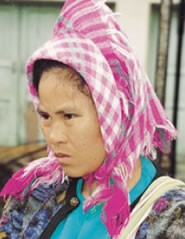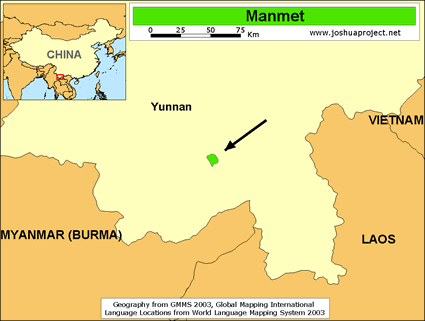In the twelfth century AD, a number of different tribes united with the Tai to establish the Jinglong Golden Hall Kingdom. The Nanzhao Kingdom, centered at Dali in central Yunnan, was overthrown by the advancing Mongol hordes of Kublai Khan in AD 1253. Thousands of minority people fled from the savage Mongols. Those who survived settled into the dozens of ethnic communities which sprang up in southern Yunnan. It was also at this time that the great Mon-Khmer people began to split into smaller, more distinct political units. The Manmet are one group today who owe their existence to this tumultuous period of history.
The Manmet were counted separately in the 1982 Chinese census and then combined into a large group of Undetermined Minorities. In the 1950s the Manmet applied to the central government in a bid to be recognized as a distinct minority group, but their application was rejected. Today the Manmet are looked down upon by both the neighboring Han Chinese and the Tai Lu people.
The Manmet are experts at tilling their sharply angled fields which seem to cling to the sides of the mountains. Every available patch of land near their villages is used for food production. They grow rice, corn, sugarcane, bananas, and various kinds of vegetables. They also raise chickens, water buffaloes, and pigs. Most Manmet women stay at home, but some earn income by selling produce at the Jinghong market. In recent years many Manmet youth have moved to the cities in search of education and work.
Most Manmet adhere to a mixture of animism and Theravada Buddhism, which is the prevalent religion in the Xishuangbanna region. Around Jinghong there are numerous temples, which serve as the focal point of each community's social life as well as a place for practicing religious rituals.
Christian churches, hospitals, and schools were established by Presbyterian missionaries in Jinghong during the 1930s and 1940s. "The people readily received the Gospel, but for many, it was very difficult to renounce sin; for them their faith was nominal. ... During the Cultural Revolution [1966-1976] ... many leaders of the church were killed." Although missionaries were active in the Jinghong area, the shy Manmet escaped their attention. Few Manmet people today have any awareness of the gospel or the name of Jesus Christ.
The young people need job skills and the ability to adapt to life away from home.
Pray for those who are seeking work. For the young who have moved away from home, pray that they will long for a Heavenly Father.
Pray for signs and wonders to happen among them and for great breakthroughs with a rapid multiplication of disciples and house churches.
Pray for bold workers who are driven by the love of the Holy Spirit to go to them.
Pray for an unstoppable movement to Christ among them.
Scripture Prayers for the Manmet in China.
Operation China. Used by permission.
| Profile Source: Joshua Project |











